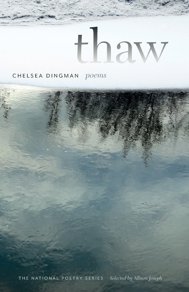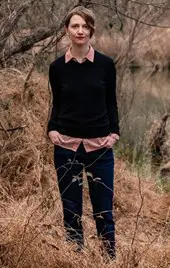The Meter Reader: In Chelsea Dingman's Thaw "intimacy is a wound and a salve at once"
Amie Whittemore

Reviewed: Thaw by Chelsea Dingman (University of Georgia Press, 2017).
The opening line of Chelsea Dingman’s debut collection, Thaw, is “what we grieve is,” and from this stark shore, we enter grief’s waters and snow, its enigmatic skies, and complicated footprints that vanish when we try to see them clearly (“Hunting, Circa 1985”). Later in the poem Dingman writes “like the camera, our eyes fail / to see what falls outside / the frame,” instructing us, gently, in how to read Thaw: while it seems to draw from losses in Dingman’s life—her father’s death, for instance, is a central concern, as are the complexities of motherhood, daughterhood, and womanhood—these poems are far from confessional. Thaw’s waters run both clear and murky. As she writes in “Little Hell,” “I escaped / the snow, not its secrets” and these secrets are what drown Dingman’s speakers as well as what gives them hope: intimacy, which is at the center of every secret, is a wound and a salve at once.
Snow and sky are two of the most prominent words, and arguably characters, in Thaw. In the first section, “snow” appears twenty-five times and “sky” twenty-seven1; notably, the word “thaw” only appears once in each section (I’ll circle back to that). Petals, pines, fire, wind, water, rain, and song also haunt Dingman’s poems and through these repetitions Dingman constructs a landscape of loss—if our loved ones are gone or have betrayed us, what is left? Water. Rain. Sky. Snow. Over and over, their unrelenting presence a marker for all that is absent. In “Sirens,” for instance, the speaker invites us to “say someone will come, but no / one comes” and she “had /a mother then. I held the wind / in my throat like a song,” beneath the “coal- // black sky, blue-lit by morning / that arrives too late.” The speaker’s mother has a wound that looks like a “starved town / in the distance.” In recounting her past the speaker beautifully renders danger: though the wind sings in her mouth, her mother is removed, a distant town herself. The poem ends,
If I could unzip cold
skin, maybe I’d know
how to stop reaching
for snow, dark blue
mountains haloed by stars.
Dingman suggests here that snow, which melts when we touch it, is a stand-in for every loss—no matter how we reach for the dead and gone, we can’t get them back. It can even feel that our very longing for them is what makes them disappear.
In the second section, “sky” and “snow” continue to dominate though “sky” increases in usage (up to thirty-four) while “snow” diminishes slightly to twenty-one uses. These shifts, while seemingly minimal are significant, indicating a shift in the balance of grief and peace. In “girl, unfinished,” Dingman’s speaker revisits the days after her father’s death, in which a family friend arrives—the man who will become her stepfather. Here, silence is a harrowing presence, appearing in four iterations: “silence / & grief,” “silence / like a wound,” “silence / & snow,” and “silence // all around—hungry sky.” By substituting “snow” in for “grief” Dingman explicitly equates the two, reinforcing this equation through the use of ampersands. “Sky,” however, while syntactically joined with silence, is not linked with the intimacy of an ampersand to it—indeed white space, a sense of space itself (“all around”) and an em dash separate them. The sky is insatiable, offering so much—falling stars, crows, rain, and yes, snow—while receiving so little. In this desirous capacity, it can hold us, even when it is pierced or broken, in a way snow never can. Dingman posits a faint, shimmering near-to-hope in this situating of the sky. In “Nocturne,” for instance, the speaker notes, twice, “I can’t see the whole sky / at once” and this inability to contain the sky wholly, this surrender to being contained by its mystery (“how bright / the bodies it holds,” the poem ends) is at least a truce of some sort: between the present and past, between the griefs that came before and those that await.
But why is it this way, Dingman’s speaker wants to know; why is every truce a shaky one? As the collection unfolds, more unanswered questions enter her poems. Snow melts, water evaporates, and pines shed their needles: only questions remain and Dingman’s do not pull any punches. The first one appears in “Testimony of Hinges,” which is a direct address to the speaker’s stepfather: “If not me, //who else do you skin?” Later in “Hiraeth,” she asks, “why have you shown me / ragged ridges, a river, / if they weren’t mine to keep?” Thaw’s questions ache and reverberate like “rain drilling the roof like nails into planks” (“Elegy for My Child”). And who exactly do these questions—and these poems—address? The collection relies heavily on direct address but only occasionally is the ‘you’ made explicitly clear: sometimes Dingman’s speakers address a dead brother and dead father, a romantic partner(s?), a stepfather, a child, God; sometimes the poems seem to address a past version of the speaker as in “girl, unfinished;” and at other times, the “you” is too enigmatic to limn—the speaker herself? Whoever’s listening? Anyone seeking the gossipy shadows traumas can cast will be disappointed in Thaw; these poems, like the sky, are choosy about what they’ll let fall from their mysterious hands.
What minimal sense of resolution the book offers can be found in its two uses the title word. Dingman is clearly drawing on all the definitions of “thaw,” but I find myself drawn to the second one: “to become free of the effect of cold.” These poems are shrouded in coldness, with only glimpses of warmth. “Immortality,” a brief lyric, ends “weeping in the thaw,” and in “Live Oaks,” one of the few “warm” poems set in Dingman’s current home of Florida, she writes
I should know
paradise, but all I see, sometimes,
are the forests I knew before, covered in snow
as we waited for the thaw.
Thus, Dingman offers to us the possibility of thawing: to free ourselves of our ghosts, we can do little more than wait. And yes, we might weep as we wait. We might become mothers, struggle at being daughters, we might long to be other than ourselves—these internal battles all take place beneath the sky, amid the snow and rain: like weather, they will pass. And us? We remain, for now, on earth, asking our questions while we can.
1In my count I included compound words featuring either snow or sky, along with possessive and plural forms. My cats frequently interrupted my tallying, so I do not claim this to be flawless addition.
Amie Whittemore is the author of the poetry collection Glass Harvest (Autumn House Press). Her poems have won multiple awards, including a Dorothy Sargent Rosenberg Prize, and her poems and prose have appeared in The Gettysburg Review, Nashville Review, Smartish Pace, Pleiades, and elsewhere. She teaches English at Middle Tennessee State University.
